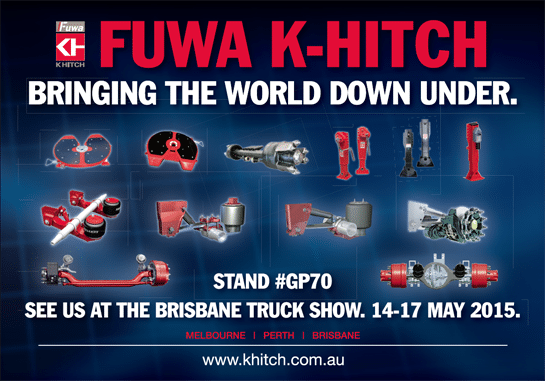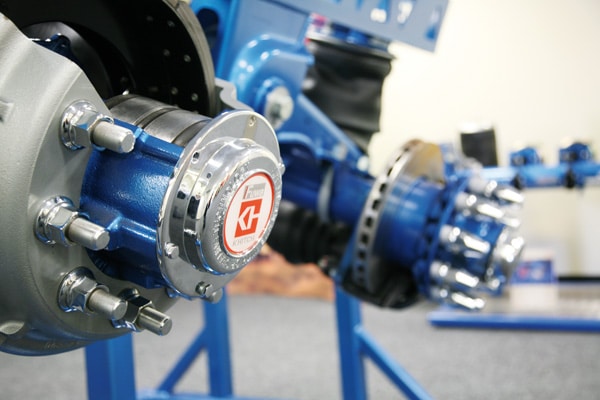
The competition in the axle and suspension market has become increasingly fierce over the past year or two, forcing suppliers to be more resourceful than ever to retain market share. If you believe Fuwa K-Hitch, though, remaining relevant is a straightforward process.
With the Australian Government desperately trying to find the right recipe for sustainable growth, standing still can prove ruinous for the many small and medium sized enterprises in the country – especially those supplying the already-fluctuating commercial road transport industry.
The axle and suspension market is a case in point. With mining investment waning and the freight task shifting to construction and container movement, it has to re-orientate itself and quickly seize the next growth opportunity to avoid being crippled by the loss of momentum in the heavy-duty market.
But to execute such a change of direction can be a balancing act – especially since there is more than one future growth strategy currently at issue. According to Chris Barrett, National Sales Manager at Fuwa K-Hitch, the only way to navigate such a situation is to be mindful and not make a rushed decision.
“There is no reason to abandon ship and rush headlong into the future,” he says. “Mining investment is waning but that doesn’t mean you can just move on. At Fuwa K-Hitch, we will continue to service the heavy-duty sector like we did when it was at the highest high, because we know that’s what we owe our faithful clientele.”
Chris explains that he and his team can draw on a vast range of mechanical suspensions – ranging from 11 tonne through to 20 tonne and available in both cast and fabricated – as well as the matching axles to make sure they have the best equipment available to suit every application in the heavy-duty segment of the market.
“Mechanical suspensions are still common in heavy-duty off-road work, where they have to endure extreme loading and harsh conditions with dust, mud and debris. That’s why our design here is a bit more traditional and uncomplicated so it can better suit the extreme environment and can be repaired by almost any basic workshop. In some cases, there’s also a certain degree of parts interchangeability to make our gear nice and easy to use, wherever you are. We are extremely proud of having developed such a strong portfolio and will continue to promote and develop it.”
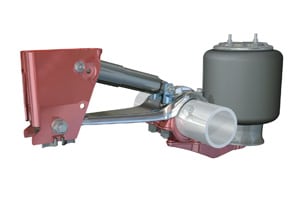
With his commitment to the heavy-duty market unaffected, Chris says flexibility is more important at the moment than frantically trying to change course. “What you need is a flexible product portfolio and a deep understanding of the Australian marketplace in all its facets, from mining through to produce haulage,” he explains. “But of course there’s a technical element to it too. You have to have access to a complete range of suspensions and axles to be able to spread the net in a time like today – and luckily, Fuwa K-Hitch has just that.”
With everyone in the axle and suspension market hustling to find new business, Chris says only those with the right portfolio will be able to succeed. “But that’s still no guarantee,” he adds. “The second step is to spec the correct gear for the job – and that’s the skill that will make all the difference going forward.”
According to Chris, Fuwa K-Hitch has accumulated the same expertise that made it famous in the mining industry for the on-road market, where air suspensions are now the norm. “Air suspensions are light in tare weight and relatively easy to service and maintain, but they offer additional features and benefits over mechanical alternatives, such as raise/lower functions, dump valves and axle lifts,” he says.
“Combined with better ride and stability characteristics and cohesion with brake and stability enhancements such as ABS and EBS control systems, air suspension systems can make for a real advantage on the highway and sometimes even off the road. That’s why our 2015-16 product catalogue includes air suspensions rated at nine, 11 and 13 tonnes and with varying ride heights to handle any possible freight task.”
Chris says there is no ‘one size fits all’ scenario in Australian trucking anymore, which is why range and know-how are equally important for a modern supplier to survive and thrive. “Environment and application, centre of gravity requirements or constraints, as well as speed and loading considerations are all important – but you need to be able to ask the right questions to find the right solution,” he explains.
“All of this information is available from Fuwa K-Hitch, who can also advise transport businesses of any limitations or warranty considerations that need to be taken into account prior to deciding what type of suspension and axle packages suit them.”
With the Australian economy entering a historic transition phase and the axle and suspension market under added pressure, Chris says customers should be “very mindful” and ensure that they are aware of service scheduling, special tooling requirements, parts listings and spare parts availability when spec’ing a new commercial vehicle.
“The competition is tough and a lot of promises are being made out there, but it will always come down to range and know-how – if you think about it, it’s actually pretty straightforward. That’s also why we think we are well prepared going into the new Financial Year – we’re flexible enough to react quickly but we are also committed to our existing clientele, which I believe will pay off in the long-term.”


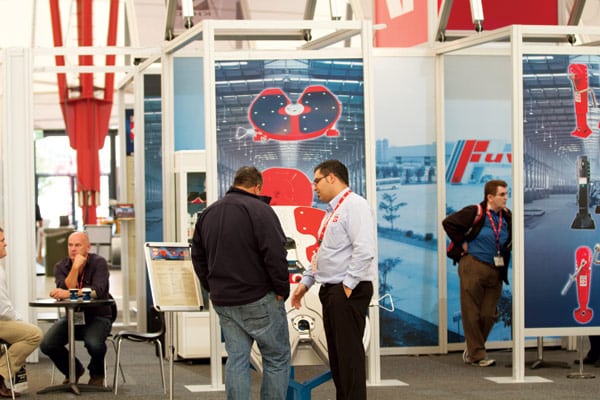
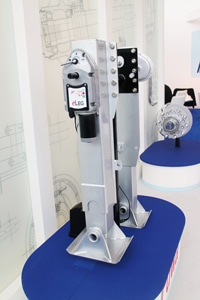 “Take the kingpin. It’s a classic example of a ‘fit and forget’ item. People neglect that it is a critical link for connecting the trailer to the truck. As a result, kingpin service is a topic that’s rarely discussed in any workshop. Do you check it all? Do you use a gauge? It’s one of those things that tend to get overlooked, even though it can severely damage the turntable if it’s faulty.”
“Take the kingpin. It’s a classic example of a ‘fit and forget’ item. People neglect that it is a critical link for connecting the trailer to the truck. As a result, kingpin service is a topic that’s rarely discussed in any workshop. Do you check it all? Do you use a gauge? It’s one of those things that tend to get overlooked, even though it can severely damage the turntable if it’s faulty.”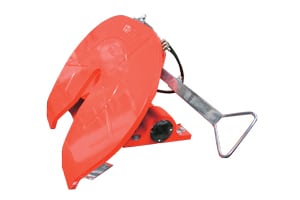 But, Chris says that image is now about to change, as companies from around the globe continue to invest in next generation technology that could see the landing leg transform from a simple reinforcement tool into a viable safety feature. Fuwa K-Hitch is leading the way with the eLeg, a fully automatic landing leg that will be on display at the Brisbane Truck Show and is now available for purchase. Designed in close co-operation with Razor International, it is said to positively affect Operational Health & Safety, maintenance, aerodynamics and idling time – even driver recruitment.
But, Chris says that image is now about to change, as companies from around the globe continue to invest in next generation technology that could see the landing leg transform from a simple reinforcement tool into a viable safety feature. Fuwa K-Hitch is leading the way with the eLeg, a fully automatic landing leg that will be on display at the Brisbane Truck Show and is now available for purchase. Designed in close co-operation with Razor International, it is said to positively affect Operational Health & Safety, maintenance, aerodynamics and idling time – even driver recruitment.